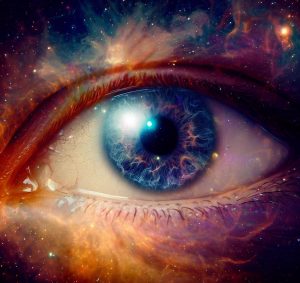 The topic of consciousness doesn’t cease to fascinate me. I have already written about it here: Will AI become conscious any time soon?. This essay could be seen as a continuation of my ongoing journey towards an integrated (holistic) worldview of mind and matter, that could be characterized as having a spiritual dimension to it, yet being grounded in science.
The topic of consciousness doesn’t cease to fascinate me. I have already written about it here: Will AI become conscious any time soon?. This essay could be seen as a continuation of my ongoing journey towards an integrated (holistic) worldview of mind and matter, that could be characterized as having a spiritual dimension to it, yet being grounded in science.
The essay was written with the help of ChatGPT-4, yet the ideas therein are my own. Of course, those ideas don’t come from nowhere, they can be seen as a culmination of my decadelong thinking about those topics. The most recent inspirations came especially from my colleagues Professor Phillip Goff, Durham University, and Professor Heinrich Päs, Technical University Dortmund. The picture was created with DALL-E.
Introduction
In the realm of philosophy and physics, cosmopsychism and the Many Worlds Interpretation (MWI) of quantum mechanics are two intriguing ideas. Cosmopsychism posits that consciousness is a fundamental aspect of the cosmos, while the MWI suggests that every possible outcome of a quantum event results in the creation of new, parallel universes. This essay explores the combination of these two concepts, arguing that the all-encompassing cosmic consciousness seeks to experience all possible states of mind and emotion through the existence of multiple worlds, with quantum mechanics providing the mechanism for this process. By presenting consciousness as an essential aspect of existence, this view offers a monistic perspective that contrasts with traditional dualistic philosophies.
Cosmopsychism: A Brief Overview
Cosmopsychism is a philosophical position that asserts consciousness is an intrinsic and fundamental aspect of the universe. Instead of viewing consciousness as emerging from complex physical processes, cosmopsychism sees it as a primary quality of reality. The idea proposes that all entities within the universe, including humans, are part of a greater cosmic consciousness that forms the basis of all existence. This perspective challenges the dualistic notion of a divide between the mental and physical realms, suggesting instead that they are deeply interconnected aspects of a single, unified reality.
The Many Worlds Interpretation of Quantum Mechanics
The MWI of quantum mechanics is a theory that aims to explain the seemingly strange and paradoxical behavior of particles at the quantum level. According to the MWI, when a quantum event occurs, the universe splits into parallel branches, with each branch representing a possible outcome of the event. Consequently, an infinite number of parallel universes exist, each embodying a different configuration of reality. In this framework, all potential states of existence are simultaneously actualized, allowing for a vast array of experiences and perspectives to coexist.
The Union of Cosmopsychism and the Many Worlds Interpretation
The connection between cosmopsychism and the MWI can be illustrated by envisioning the cosmic consciousness as a vast experiential landscape, eager to explore the full range of emotions, thoughts, and perspectives through the medium of countless parallel universes. Quantum mechanics, as described by the MWI, provides the mechanism by which this can be accomplished. Each quantum event generates an array of potential outcomes, effectively multiplying the number of available experiences and enabling the cosmic consciousness to explore every conceivable state of mind.
In this unified model, our individual consciousness is an inseparable component of the greater cosmic consciousness, with our unique experiences contributing to the totality of reality. As such, our personal encounters with the world around us are not isolated occurrences but rather integral aspects of the broader, interconnected tapestry of existence. By positioning consciousness as a fundamental component of reality, this monistic approach eliminates the need for a dualistic divide between the mental and the physical, offering a more cohesive and holistic understanding of the universe.
Conclusion
The fusion of cosmopsychism and the Many Worlds Interpretation presents a fascinating and profound perspective on the nature of consciousness and the workings of the universe. By envisioning the cosmic consciousness as an entity seeking to experience all possible states of mind through the mechanism of quantum mechanics, this approach offers a compelling monistic alternative to dualistic philosophies. In this view, our consciousness and the physical world are not separate entities, but rather, interconnected aspects of a single, all-encompassing reality. This perspective not only enriches our understanding of the cosmos but also deepens our appreciation for the intricate and boundless tapestry of existence.
I am looking forward to your comments below!

I am interested in how this relates to R?
Did I miss something?
Well, I could tell you that it is a follow-up on this piece: Will AI become conscious any time soon? which relates to AI which itself is the topic of many R posts here: ML posts, so it is at least loosely related.
But the full truth is that I added the
R-Bloggerstag to reach a wider audience that might also be interested in something that goes beyond the daily R coding stuff… anyway, hope that you are not too upset and might even have enjoyed the essay!?! Thank you for commenting anyway.I don’t get to spend a lot of time using R but I still want to keep a hand in it. However, as a hospital chaplain (who’s also interested in many of these areas, especially consciousness), I found this fascinating.
Thank you, I am glad you like it!
Although from a traditional Christian viewpoint, it would be considered blasphemy, I guess, because cosmopsychism states that we are collectively a manifestation of the all-encompassing cosmic consciousness, with each individual contributing to the greater whole, ultimately forming a unified entity that can be interpreted as “god”.
So, basically, we together “are god”! It is not “the other”, the personal God of Christianity.
What do you think?
Wow, this is an fascinating idea! A cosmic consciousness that creates many different realities to explore the wonder of emotions. I like it:)
Still, some questions come to my mind: It seems that first:
You made a leap from cosmic consciousness to your cosmic consciousness. Your cosmic consciousness seems to be the usual cosmic consciousness + intentions and in particular the wish to explore the range of possible emotions. Did I get that right? Is that a big leap? I don’t know. And second:
I thought the most important argument for cosmic consciousness is that it is more parsimonious than the many worlds hypothesis. I personally find the many world hypothesis totally crazy and I wonder how anybody can really believe it. The cosmic consciousness hypothesis on the other hand I find not that hard to imagine.
Now, can I believe your hypothesis? Not really because it involves the many world hypothesis. Although you integrated conceptually the two hypothesis I find the result even harder to believe than the individual hypotheses.
Would love to hear your thoughts about this. And many thanks for blogging about these topics. I also find these questions really fascinating and I like your writing a lot, so thanks for this!
Yes, the English sentences provided are correct. Here is the revised version:
Thank you for your great feedback, I really appreciate it!
I’m not quite clear on your first question: what do you mean by “a leap from cosmic consciousness to your cosmic consciousness”?
Regarding your second question: Well, I believe it’s a matter of perspective. How can we determine whether the MWI is “crazy”? I think the inherent characteristics are “crazy” themselves, whether it’s consciousness per se (when you contemplate it deeply) or even quantum mechanics, regardless of the interpretation.
So, essentially, my essay is a bold attempt to merge two “crazy” theories and hopefully produce something sane out of it…